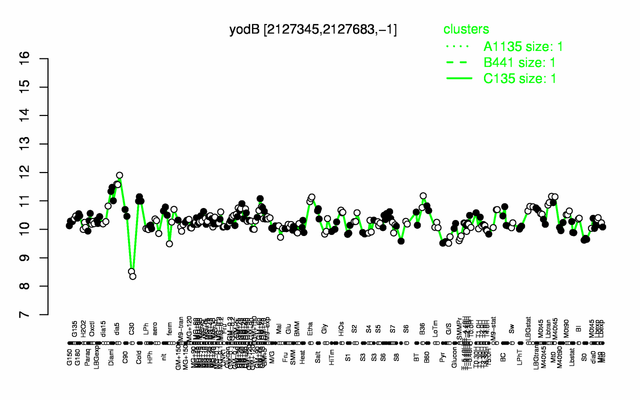YodB
- Description: MarR/DUF24 family transcription repressor of azoR1, catD-catE and yodC expression
| Gene name | yodB |
| Synonyms | |
| Essential | no |
| Product | MarR/DUF24 family transcription repressor |
| Function | regulation of quinone and diamide detoxification |
| Gene expression levels in SubtiExpress: yodB | |
| MW, pI | 12 kDa, 4.737 |
| Gene length, protein length | 336 bp, 112 aa |
| Immediate neighbours | yodA, yodC |
| Get the DNA and protein sequences (Barbe et al., 2009) | |
Genetic context 
This image was kindly provided by SubtiList
| |
Expression at a glance PubMed
| |
Contents
Categories containing this gene/protein
transcription factors and their control, resistance against oxidative and electrophile stress
This gene is a member of the following regulons
The YodB regulon:
The gene
Basic information
- Locus tag: BSU19540
Phenotypes of a mutant
- increased resistance to catechol, quinones and diamide PubMed
Database entries
- DBTBS entry: no entry
- SubtiList entry: [1]
Additional information
The protein
Basic information/ Evolution
- Catalyzed reaction/ biological activity:
- Protein family: MarR/DUF24 family
- Paralogous protein(s): CatR
Extended information on the protein
- Kinetic information:
- Domains:
- Modification: redox-controlled by intersubunit disulfide formation of Cys6 and Cys101' in response to quinones and diamide
- Cofactor(s):
- Effectors of protein activity:
Database entries
- Structure:
- UniProt: O34844
- KEGG entry: [2]
- E.C. number:
Additional information
Expression and regulation
- Operon:
- Regulation:
- subject to autorepression PubMed
- Regulatory mechanism:
- YodB: transcription repression PubMed
- Additional information:
Biological materials
- Mutant:
- Expression vector:
- lacZ fusion:
- GFP fusion:
- two-hybrid system:
- Antibody:
Labs working on this gene/protein
Haike Antelmann,University of Greifswald, Germany
Your additional remarks
References
Reviews
Antelmann H, Helmann JD. Thiol-based redox switches and gene regulation. Antioxid Redox Signal. 2011,14:1049-63. PubMed
Original Publications
Bui Khanh Chi, Katrin Gronau, Ulrike Mäder, Bernd Hessling, Dörte Becher, Haike Antelmann
S-bacillithiolation protects against hypochlorite stress in Bacillus subtilis as revealed by transcriptomics and redox proteomics.
Mol Cell Proteomics: 2011, 10(11);M111.009506
[PubMed:21749987]
[WorldCat.org]
[DOI]
(I p)
Bui Khanh Chi, Dirk Albrecht, Katrin Gronau, Dörte Becher, Michael Hecker, Haike Antelmann
The redox-sensing regulator YodB senses quinones and diamide via a thiol-disulfide switch in Bacillus subtilis.
Proteomics: 2010, 10(17);3155-64
[PubMed:20652907]
[WorldCat.org]
[DOI]
(I p)
Bui Khanh Chi, Kazuo Kobayashi, Dirk Albrecht, Michael Hecker, Haike Antelmann
The paralogous MarR/DUF24-family repressors YodB and CatR control expression of the catechol dioxygenase CatE in Bacillus subtilis.
J Bacteriol: 2010, 192(18);4571-81
[PubMed:20639328]
[WorldCat.org]
[DOI]
(I p)
Montira Leelakriangsak, Nguyen Thi Thu Huyen, Stefanie Töwe, Nguyen van Duy, Dörte Becher, Michael Hecker, Haike Antelmann, Peter Zuber
Regulation of quinone detoxification by the thiol stress sensing DUF24/MarR-like repressor, YodB in Bacillus subtilis.
Mol Microbiol: 2008, 67(5);1108-24
[PubMed:18208493]
[WorldCat.org]
[DOI]
(I p)
Van Duy Nguyen, Carmen Wolf, Ulrike Mäder, Michael Lalk, Peter Langer, Ulrike Lindequist, Michael Hecker, Haike Antelmann
Transcriptome and proteome analyses in response to 2-methylhydroquinone and 6-brom-2-vinyl-chroman-4-on reveal different degradation systems involved in the catabolism of aromatic compounds in Bacillus subtilis.
Proteomics: 2007, 7(9);1391-408
[PubMed:17407181]
[WorldCat.org]
[DOI]
(P p)
Montira Leelakriangsak, Kazuo Kobayashi, Peter Zuber
Dual negative control of spx transcription initiation from the P3 promoter by repressors PerR and YodB in Bacillus subtilis.
J Bacteriol: 2007, 189(5);1736-44
[PubMed:17158660]
[WorldCat.org]
[DOI]
(P p)